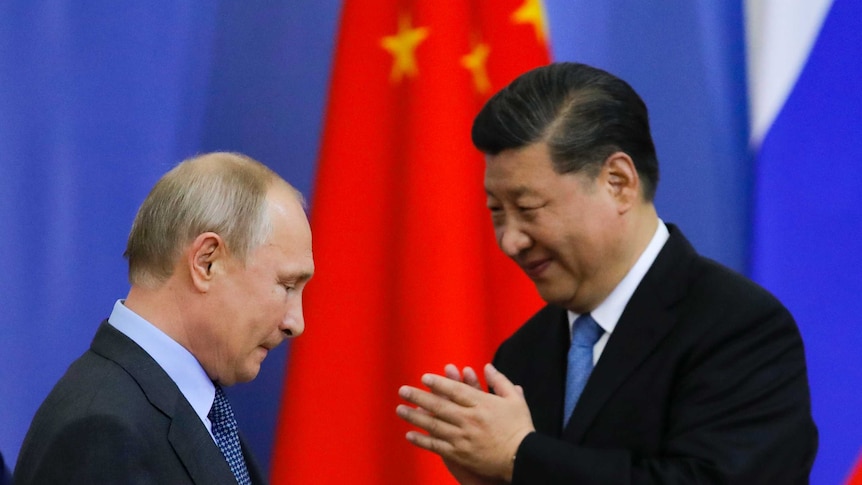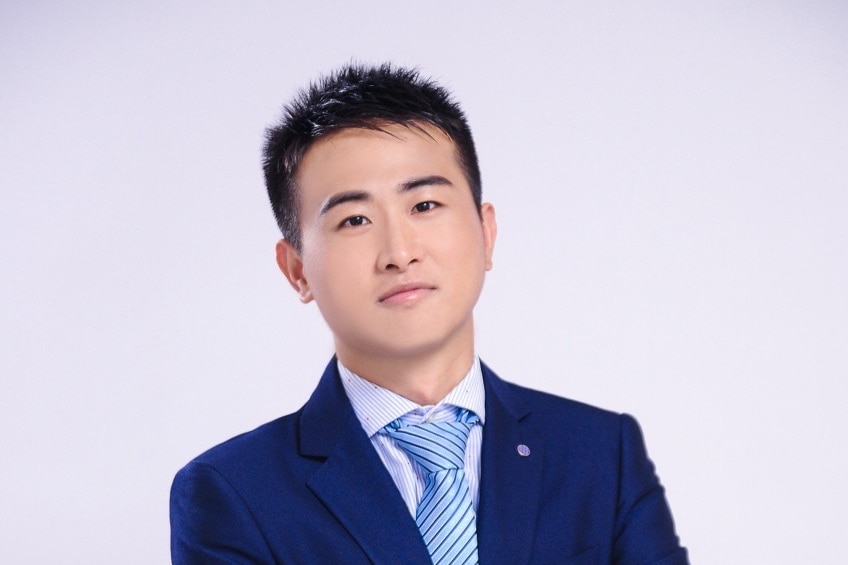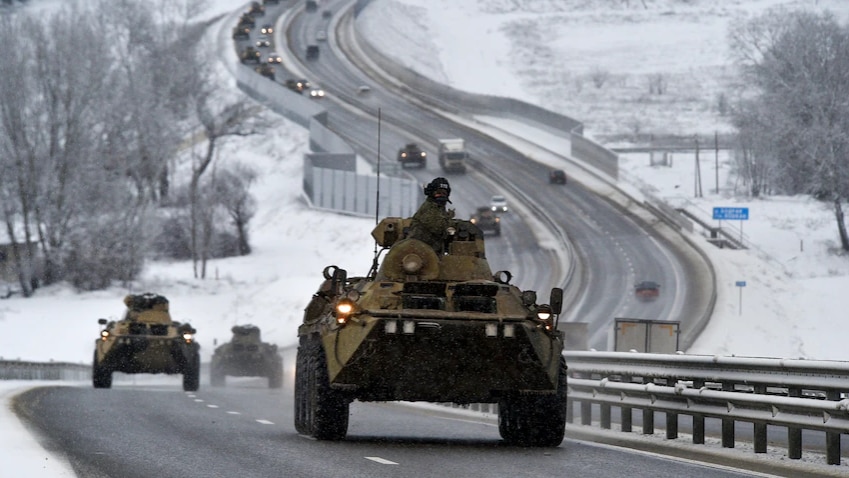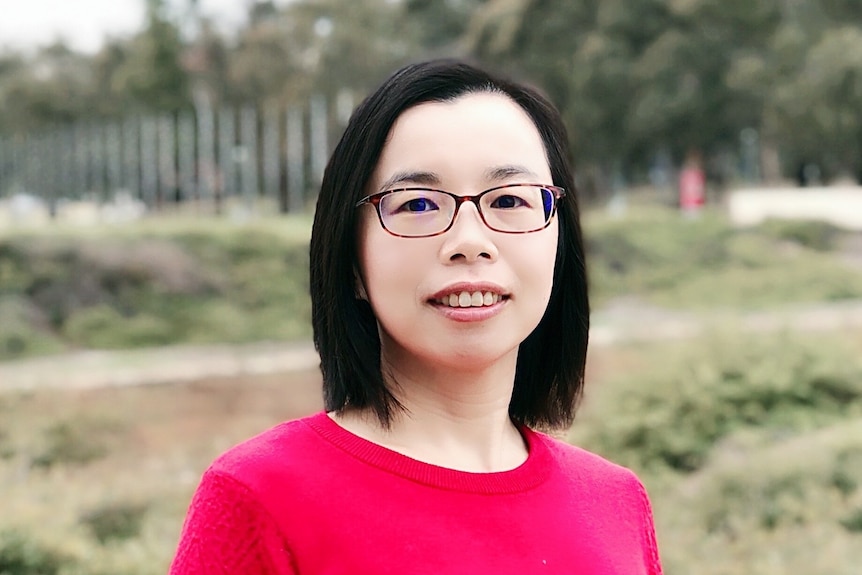By Dong Xing

Chinese President Xi Jinping and Russian President Vladimir Putin have declared there are "no limits" to their partnership in standing up to the West.
(AP: Dmitri Lovetsky/Pool)
As the world anxiously watches the Russia-Ukraine crisis unfold, China remains wedged in an awkward position.
Key points:
Beijing is yet to express whether its support lies with Russia or Ukraine
China worries the crisis will affect its policies on Taiwan, Tibet and Xinjiang
Ukraine has helped China modernise its military and is a major trading partner
Beijing has declared that its partnership with Moscow has "no limits" while still maintaining strong ties with Kyiv.
Under the premiership of Xi Jinping, China has furthered its deep strategic and business partnerships with both countries, leaving it hesitant to pick a side openly.
Not only is China Ukraine's largest trading partner, but Kyiv has also helped Beijing build up its military assets.
Jiang Yuan, a China-Russia relations expert at the Queensland Technology University, said China had no intention to openly express sympathy for Ukraine, while it hasn't fully supported Russia either.
"China cannot directly oppose Russia due to its quasi-alliance with Russia and common pressure from the US," he told the ABC.
There's a third consideration at play too, as experts say China doesn't want to push the EU away by supporting Russia.
As many other countries urge their citizens and embassy staff to leave — some being evacuated even — China has only advised its citizens to remain vigilant.
It has slammed the West for creating an air of tension, yet there is still no strong indication of whether it's Russia or Ukraine that China favours.
So how much is the silence as much about domestic politics as international relations?
And can Beijing continue to have it both ways with two countries in heightened states of military awareness?
Ukraine crisis may shake China's stance on Taiwan, Xinjiang and Tibet
Australian Prime Minister Scott Morrison has criticised China for remaining "chillingly silent" on the crisis, suggesting that Beijing had given Moscow tacit approval for an invasion.
But it is not the first time China has kept quiet on Ukraine's disputes.
In China, self-determination and foreign interference on sovereignty are political taboos, with there being strong opposition to separatism in Tibet and Uyghur-dominated Xinjiang, and Taiwan's increasingly independent self-identity.
In 2014, 97 per cent of voters in Crimea backed a move to leave Ukraine and join Russia.
Western countries tried to scuttle the outcome at the UN, but it was unsuccessful.
Tellingly, while Russia rejected the resolution pushed by the West, China abstained.

Australian Prime Minister Scott Morrison has criticised China for remaining "chillingly silent" on the crisis, suggesting that Beijing had given Moscow tacit approval for an invasion.
But it is not the first time China has kept quiet on Ukraine's disputes.
In China, self-determination and foreign interference on sovereignty are political taboos, with there being strong opposition to separatism in Tibet and Uyghur-dominated Xinjiang, and Taiwan's increasingly independent self-identity.
In 2014, 97 per cent of voters in Crimea backed a move to leave Ukraine and join Russia.
Western countries tried to scuttle the outcome at the UN, but it was unsuccessful.
Tellingly, while Russia rejected the resolution pushed by the West, China abstained.
Jiang Yuan says the crisis is far too politically sensitive for Beijing to openly support Russia.(Supplied)
According to Mr Jiang, this has more to do with internal politics than external relationships.

According to Mr Jiang, this has more to do with internal politics than external relationships.
"It is simply impossible for China to shore up the recognition of reincorporation of Crimea in the Russian narrative or the recent Ukraine tensions," he said.
Basically, supporting succession abroad might come back to harm the Chinese Communist Party, Mr Jiang explained.
"Crimea is Ukraine's sovereign territory. If it can simply have a referendum to join Russia or become independent, this means Xinjiang, Tibet, and Taiwan can simply do so as well," Mr Jiang said.
"This is impossible for China to accept because these are core interests of the Chinese government and also concern legitimacy of the Communist Party."
Ukraine is China's military technology provider
As a former Soviet Union state, Ukraine inherited much of the military technology and equipment China desired.
So it started buying what it wanted from Ukraine, the most significant of which was China's first aircraft carrier, the Liaoning.
The unfinished aircraft carrier became China's in 1998 and helped modernise its military infrastructure.
"The Chinese Navy was thereby able to leapfrog an estimated 15 years of research and development to achieve aircraft carrier capabilities in 2013 when the Liaoning entered active service," Mr Jiang said.
Ukraine has helped Beijing build up its military assets and reach capabilities on par with US equipment and technologies. (Reuters)
Since then, several of China's large warships, including the country's second aircraft carrier, the Shandong, have used propulsion systems with redeveloped Ukrainian gas turbines.
Ukrainian engineering has also helped boost China's fighter jet fleets.
Ukraine was responsible for aiding in the development of China's J-11 jets, which are considered an equivalent of America's F-15 fighters.
Since then, several of China's large warships, including the country's second aircraft carrier, the Shandong, have used propulsion systems with redeveloped Ukrainian gas turbines.
Ukrainian engineering has also helped boost China's fighter jet fleets.
Ukraine was responsible for aiding in the development of China's J-11 jets, which are considered an equivalent of America's F-15 fighters.
'China doesn't want to push the EU towards the US'
Experts say China doesn't want to push the EU or Germany further towards the US.
(AP: Olivier Hoslet)
The full scale of the arms trade between China and Ukraine is unknown, but since 2020 China has been the eastern European country's top trading partner.
Putin celebrates new partnership to build nuclear reactors for China
Joining Xi Jinping to launch the construction of Russian-designed reactors at Chinese nuclear power plants, Vladimir Putin says the relationship between their nations has reached a new high.
The full scale of the arms trade between China and Ukraine is unknown, but since 2020 China has been the eastern European country's top trading partner.
Putin celebrates new partnership to build nuclear reactors for China
Joining Xi Jinping to launch the construction of Russian-designed reactors at Chinese nuclear power plants, Vladimir Putin says the relationship between their nations has reached a new high.
Read more
China also sees Ukraine as a key entry point for its Belt and Road Initiative (BRI) objectives, its ambitious global infrastructure development strategy.
China's Ministry of Commerce has said Ukraine could be used to explore investment opportunities in the EU as it has a free trade agreement with the EU while being a participant in the BRI.
Experts have also pointed to China's need to maintain a workable relationship with the EU, especially Germany, during increasingly intense US-China competition.
"China doesn't want to push the EU or Germany towards the US further," Mr Jiang said.

China also sees Ukraine as a key entry point for its Belt and Road Initiative (BRI) objectives, its ambitious global infrastructure development strategy.
China's Ministry of Commerce has said Ukraine could be used to explore investment opportunities in the EU as it has a free trade agreement with the EU while being a participant in the BRI.
Experts have also pointed to China's need to maintain a workable relationship with the EU, especially Germany, during increasingly intense US-China competition.
"China doesn't want to push the EU or Germany towards the US further," Mr Jiang said.
Dr Guan says China will eventually need to weigh Ukraine and Russia.(Supplied)
Dr Jade Guan, a lecturer in strategy studies at Deakin University, said China was seeking to further its negotiations with the EU over the Comprehensive Agreement on Investment (CAI).
The CAI, designed to open China's domestic market, will give enormous advantages to European companies.
Under the agreement, China promises to no longer force foreign companies to share sensitive know-how.
However, the deal was suspended after the EU and China both imposed sanctions on each other's officials and institutions over claims of Uyghur "genocide".
"Germany and France are leading the negotiation of the CAI with China, and France will have its election soon," Dr Guan said.
While "it would be wise for Beijing not to support Russia openly," Dr Guan added that eventually China will need to weigh Ukraine and Russia.
"Both countries are strategic partners for China, but which one is more important in terms of economy, energy and diplomacy?"
Dr Jade Guan, a lecturer in strategy studies at Deakin University, said China was seeking to further its negotiations with the EU over the Comprehensive Agreement on Investment (CAI).
The CAI, designed to open China's domestic market, will give enormous advantages to European companies.
Under the agreement, China promises to no longer force foreign companies to share sensitive know-how.
However, the deal was suspended after the EU and China both imposed sanctions on each other's officials and institutions over claims of Uyghur "genocide".
"Germany and France are leading the negotiation of the CAI with China, and France will have its election soon," Dr Guan said.
While "it would be wise for Beijing not to support Russia openly," Dr Guan added that eventually China will need to weigh Ukraine and Russia.
"Both countries are strategic partners for China, but which one is more important in terms of economy, energy and diplomacy?"
No comments:
Post a Comment